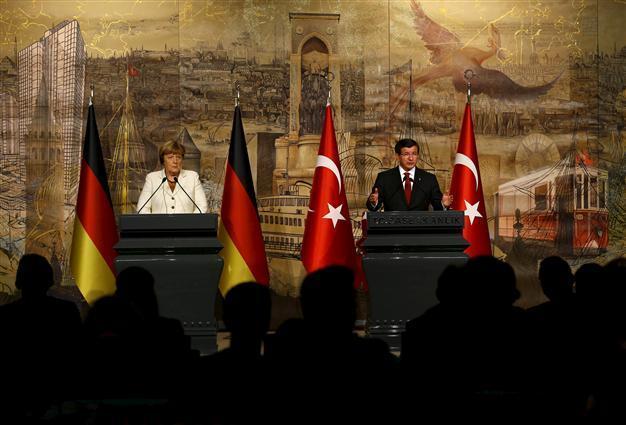Merkel shifts EU-Turkey stance upon migrant crisis
ISTANBUL

Turkish PM Davutoğlu (R) and German Chancellor Merkel (L) hold a joint press meeting in Istanbul on Oct. 18, 2015. Reuters Photo
German Chancellor Angela Merkel has pledged to give support to four Turkish demands on which Ankara has insisted in return for agreeing to a migrant action plan with the European Union.
“There are four elements. Germany is ready to give support on these issues,” Merkel said Oct. 18 during a joint press conference with her Turkish counterpart, Ahmet Davutoğlu.
Merkel made the trip to Turkey amid increasing pressure at home after hundreds of thousands of refugees poured into Germany over the summer.
Davutoğlu said Turkey was ready to work with Germany and the EU on the migration crisis and would take all measures to prevent human trafficking. However, Ankara is focused on four issues, the prime minister said: the opening of negotiation chapters, visa liberalization, the transfer of 3 billion euros from the EU to Turkey for migrant support and the invitation of Turkish leaders to EU summits.
Davutoğlu stressed the “fair share of the burden” on the migration problem and welcomed Merkel’s approach on the issue, while noting that the figures were of secondary importance.
Davutoğlu expressed Turkey’s expectation for the implementation of visa privileges for Turkish nationals by 2016, in return for a readmission agreement which would pave the way for the EU to send migrants back to Turkey.
“In terms of the migration crisis, we seek to contribute a new vision to relations between the EU and Turkey and get out of its frozen situation,” he said.
“We agreed on accelerating the opening of negotiation chapters 17, 23, 24,” he said.
Turkey and Germany will continue cooperation through “working groups” which will convene this week, Davutoğlu said.
Expressing support for the Turkish demands, Merkel especially highlighted that they would work to open Chapter 17, and said they would “discuss” details on Chapters 23 and 24. The German chancellor also reiterated her country’s longstanding hesitations about Turkey’s prospective membership in the union and said, “Turkey’s full membership is an open-ended issue.”
“How can we organize the accession process more dynamically?” Merkel asked.
Working groups will study the “share of burden,” Merkel said, noting that the invitation of Turkish leaders to EU summits would be evaluated by the union.
Ahead of her visit to Turkey, Merkel stated that Turkey’s help was needed to stem the flow of refugees to Europe but that this had not changed her view that Ankara should not become a member of the European Union. “I have always been against EU membership, President [Recep Tayyip] Erdogan knows this, and I still am,” Merkel told a talk show on German public broadcaster ARD on Oct. 7.
Turkey and European Union agreed to a “draft” agreement on migrants last week which will be implemented after Ankara’s political demands are met by Brussels.
The EU has suddenly rediscovered Turkey, Turkish Foreign Minister Feridun Sinirlioğlu told reporters on Oct. 16. The minister identified the draft agreement on migrant action plant as an “ad referendum” which is for further consideration by one having the authority to make a final decision.
Close military cooperation The two leaders also discussed Syria, with Turkey informing the German chancellor about violations of Turkish airspace and the change of the power balance in the country, Davutoğlu said, adding that he delivered some intelligence information.
Despite Germany’s withdrawal of Patriot batteries from Turkey, the two countries will step up for closer military cooperation, Merkel said.
Davutoğlu also condemned an attack on the independent candidate for mayor of Cologne, Henriette Reker.
The German and Turkish foreign, defense and economy ministers will also meet in January 2016 in Berlin, Davutoğlu said.
Merkel also met with Erdoğan. Making a joint statement, Erdoğan stated that the two countries recommended an “action plan against terror.”
